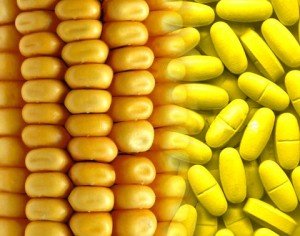A treatment for a rare disease, which could previously only be manufactured by expensive cell culture techniques, may now be produced by greenhouse-grown maize.
 The findings, published today in Nature Communications, could dramatically decrease the cost of treating patients with a rare, but life-threatening inherited disease.
The findings, published today in Nature Communications, could dramatically decrease the cost of treating patients with a rare, but life-threatening inherited disease.
Researchers created transgenic maize seeds which can synthesize alpha-L-iduronidase, an enzyme used to treat mucopolysaccharidosis I (MPS1). Sufferers of this disease endure progressive damage to the heart, brain, and other organs, which if left untreated, results in death in early childhood.
Currently, the enzyme is extremely costly to produce, with treatments typically ranging from $300,000 to $500,000 per year for children and much higher for adults, since the enzyme can only be made by cultures of mammalian cells that are capable of performing the biochemical tweaks required to make the enzyme function.
By finding a way to trick the maize into making certain modifications, they were able to produce the drug in maize seeds, highlighting a process that could ultimately be used in disease treatment.
Our colleagues at the UKSMC collected the following expert commentary. Feel free to use these quotes in your reporting. If you would like to contact a New Zealand expert, please contact the SMC (04 499 5476; smc@sciencemediacentre.co.nz).
Prof George Lomonossoff, Plant Biotechnologist at the John Innes Centre, said:
“This is a very interesting and novel approach to addressing the problems of unwanted plant-specific glycosylation of pharmaceutical proteins expressed in plants.
“As the authors discuss in the paper, this issue is normally addressed by a combination of knocking out the plant genes and expressing genes from the mammalian pathway. This research describes a way of circumventing the whole issue by using an mRNA sequence to target iduronidase protein expression. The result is a form of the protein which retains its activity but without the plant-specific glycans which could cause undesirable immune responses in humans. Overall, this work is an important addition to the toolkit for producing pharmaceuticals in plants.
“The paper isn’t actually about a new type of treatment or a how large amounts of a pharmaceutical can be produced in plants – it’s about how to target expression within a plant to avoid a protein causing unwanted side-effects in humans. Obviously any drug produced using this approach will have to undergo rigorous clinical testing, just as any other protein would.
“This is GM technology which offers a means for the production of a better quality pharmaceutical. However, the clinical efficacy and safety of the drug will need to be proven.”
Dr Penny Sparrow, senior scientist at the John Innes Centre, said:
“One of the major challenges in producing plant-made pharmaceuticals is to produce molecules that are accepted by the human immune system. Therapeutic proteins are currently produced using GM technology applied to mammal and bacterial cells. These proteins attract sugar molecules that ensure they fold into a structure that is recognised by the human immune cells and not rejected. This is known as glycosylation.
“This new research represents a major advance in understanding and manipulating the way sugars bind to proteins produced in plants, so they too can be accepted by the human immune system. If we want to produce cheap drugs for lots of people, plants like maize offer great potential because large volumes of seed can be produced, stored easily for long periods, and sterilised easily for manufacturing.
“But there are still barriers to overcome, and it is not yet clear how much of a drug could be produced this way. Science can be anticipated to overcome this issue in time, but patients will only benefit if the pharmaceutical giants will rise to the challenge of the cost, time and regulatory burden of seeing these plants finally reach the vision of large scale field production. This remains to be seen.”